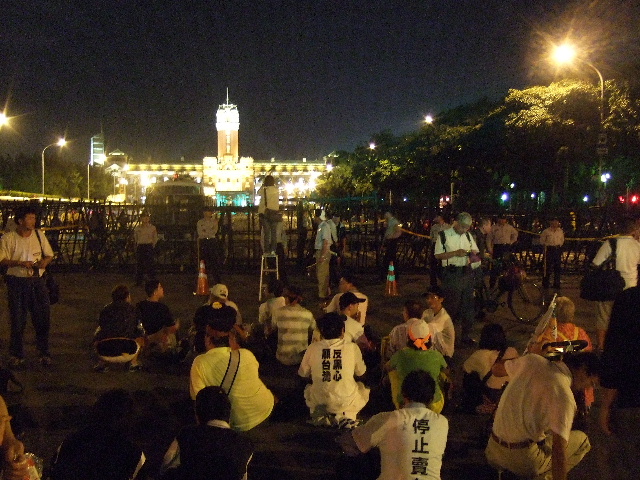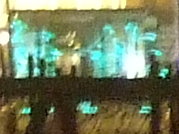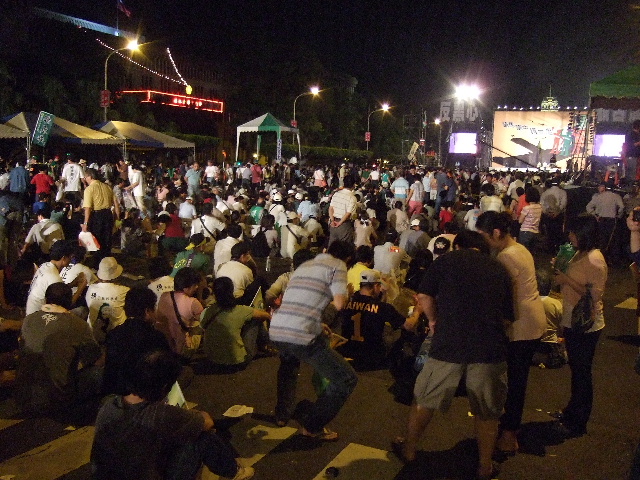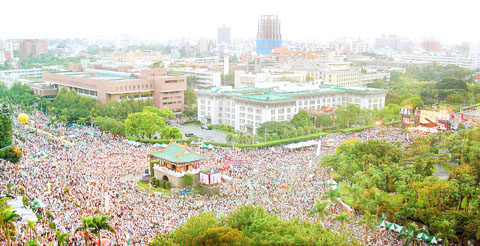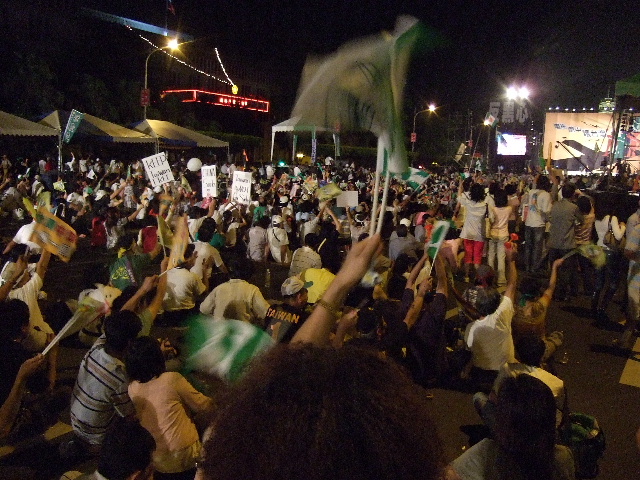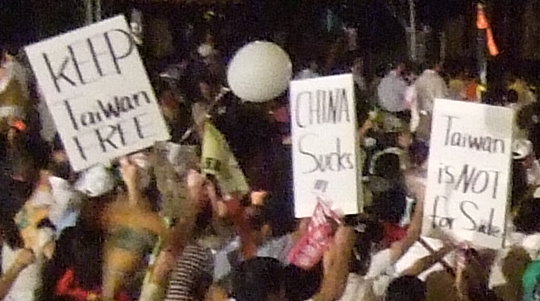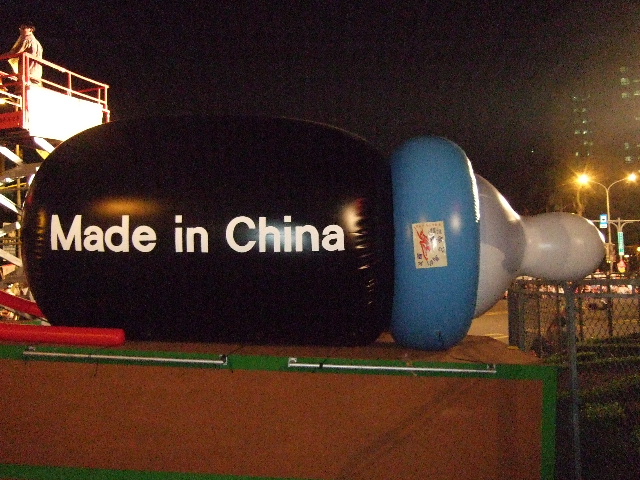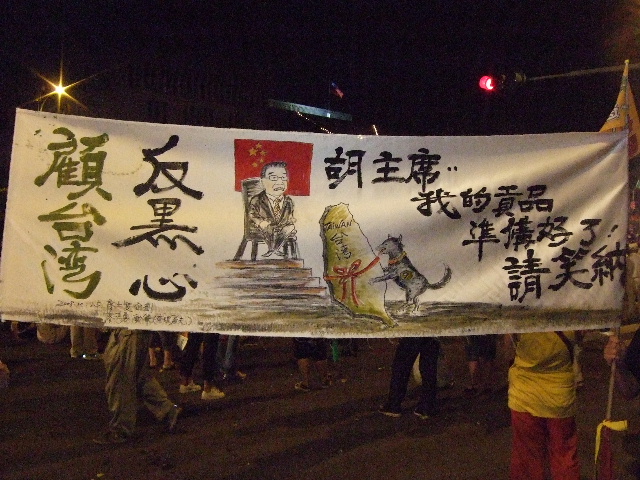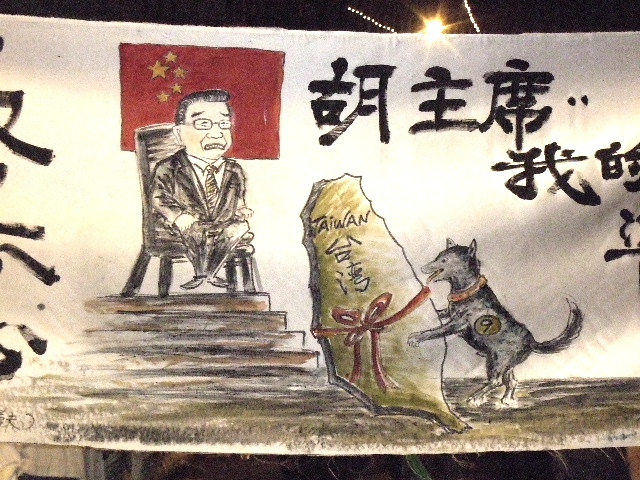(And perhaps a few bad ones as well . . .)
Ran across Dr. William Fang's column on Wednesday, the one titled, Two shining examples of the judiciary: HK, Singapore. Fang has a reason for praising Singapore in particular — prior to the Taiwanese presidential elections, then-KMT-candidate Ma Ying-jeou suggested undemocratic Singapore was a model worthy of Taiwanese emulation. Fang gives away the game near the end of his column:
It is well-known that quite a few political activists tend to overemphasize the universal value of the kind of "freedom of speech" cherished by them . . .
In other words, wouldn't it be terrific if "political activists" who disagree with the policies of the KMT government were slapped with defamation suits and muzzled — just like they'd be in Singapore. Which (didn't you know?) has one of the BEST judicial systems in Asia?
(See pages 39-45 of this document for a short list of "political activists" who have been silenced by the Singaporean oligarchy. They include such bomb-throwing radicals as the Far Eastern Economic Review, the International Herald Tribune, the Economist and the Asian Wall Street Journal.)
A bit of googling turned up a report of the survey Fang discussed, from Yahoo! Singapore:
Regional financial centres Hong Kong and Singapore have the best judicial systems in Asia, with Indonesia and Vietnam the worst, a survey of expatriate business executives showed.
[. . .]
The Hong Kong—based [Political and Economic Risk Consultancy] said 1,537 corporate executives working in Asia were asked to rate the judicial systems in the countries where they reside, using such variables as the protection of intellectual property rights (IPR) and corruption.
Transparency, enforcement of laws, freedom from political interference and the experience and educational standards of lawyers and judges were also considered.
"Year after year our perception surveys show a close correlation between how expatriates rate judicial systems and how they rate the openness of a particular economy," PERC said.
"Better judicial systems are associated with better IPR protection, lower corruption and wealthier economies."
[…]
PERC noted the survey involved expatriate business executives, not political activists, so criteria like contracts and IPR protection were given more weightage.
It appears that the survey itself lies behind a paywall, but the consultancy was upfront enough to point out what should be obvious: foreign businessmen are not likely to have first-hand experiences with another country's family law, criminal law, or free speech law, for that matter. But it IS highly probable that they form impressions of another country's commercial law — if for no other reason than that cases like that get talked about over drinks at the local executive watering hole.
And so, on the narrow issue of which countries in Asia best treat commercial law, I'll grant that Singapore deserves the crown alongside Hong Kong. But in order to say Singapore has one of the "best" judiciaries in Asia, it also has to to demonstrate its superiority in the other areas of law which I've just mentioned. On those scores, how does it stack up?
I'll leave it to others to describe Singapore's family and criminal law — although I'd question the wisdom of any legal system which places a higher priority on regulating chewing gum than prostitution.
With regards to free speech however, Singapore has adopted a system of soft Stalinism. Stalinism with Skyscrapers, if you will. Of course, no one in the City-State actually winds up in a gulag for unapproved speech — no, no, the ruling Oligarchs merely bankrupt them with defamation suits instead. Which makes for a very civilized and admirable system, indeed.
Fang has this to say about the independence of Singapore's courts:
. . . it's hard to imagine that the Singaporean government intends to deliberately bend the judiciary to its wish and succeed in doing so . . .
A few correctives for folks suffering Fang's failure of imagination:
- No member of the Oligarchy has EVER lost a defamation suit against an opposition member. Ever. 100% conviction rate. The results of a conviction can be fines, bankruptcy, imprisonment and the loss of one's seat in parliament. Hey, why bother winning elections, when you can crush your opposition with the brute power of the Law instead? (see p 7 )
- Many Singaporean judges do not have tenure and can be shuffled into insignificant positions by the Legal Service Commission if their rulings do not satisfy the Oligarchy. Since the Legal Service Commission is under the control of the executive branch, these judges cannot be considered to be independent of the politicians in power. (see p 52 and 55 )
- Singapore's Chief Justice, Attorney General and Supreme Court judges DO have tenure, and can serve to the age of 65. Beyond that age however, the President has the power to extend their contracts at his discretion. In plainer English: Play ball on important cases, and the Oligarchy lets you keep your job past retirement. Go your own way, and you're screwed. (see p 55 )
- Members of the Oligarchy who have sued Opposition members for defamation have been awarded 30 TIMES more in damages than ordinary citizens in non-political defamation suits. If nothing else, this suggests the Singapore judiciary routinely violates the principle of equality before the law. (see p 60-61 )
Because of two race riots in the '50s and '60s, the Singaporean government passed a set of anti-assembly laws (see p 62). In practice, these now serve not to prevent race riots, but as instruments of repression against opposition rallies (see p 63).
Following the race riots, the government also instituted hate-speech laws, which forbid speech promoting "racial or religious disharmony". But again, the Oligarchy wields these as a weapon against the opposition. Dare to criticize government racial or religious policies (such as the ruling party's ban against Muslim headscarves in schools) and one of those supposedly "independent" judges will hand you a pretty hefty fine. (Conveniently enough, members of the ruling clique never seem to run afoul of these laws — which can only be because EVERY SINGLE ONE of the Oligarchy's policies magically ends up promoting racial and religious harmony!)
Fang concludes with this:
In view of the [economic] successes Singapore has achieved so far, both its government and its judicial branch should feel proud of themselves despite certain criticisms.
All this talk reminds me of a Singaporean I knew way back when in my university days. May have been the only Singaporean I've ever known. I vaguely remember his name, but for our purposes, I'll call him "Lee".
Now "Lee" was a good guy, but kind of on the glum side. And as graduation approached he became even more morose than usual. Seems he was PRETTY UNHAPPY with the prospect of going back to his home country. I thought it'd be prying to ask him why.
Men like Dr. Fang must be mystified by guys like "Lee". I mean, Singapore's clean. Harmonious. Got a high economic growth rate. A per capita income that's the envy of the world (about $50,000 / person, though it was less back then).
You probably see where I'm going with this. "Lee" didn't like certain aspects of his country, but he didn't have the democratic power to vote the bums out. Instead, he was going to vote the only way that was left to him. With his feet.
Before you object, I'll admit the existence of one "Lee" from Singapore is an anecdote.
Thousands of Lees however, are A Problem . . .
. . . one survey [of emigration] has placed Singapore’s outflow at 26.11 migrants per 1,000 citizens – the second highest in the world. Only [East Timor] (51.07) fares worse. [emphasis added]
[…]
More educated Singaporeans – many taking their children with them – are leaving or are planning to leave their country . . .
A recent indication of the scope of the dilemma was the rising number of Singaporeans who asked for a document needed to apply for permanent residency overseas.
It has exceeded 1,000 a month to reach 12,707 last year from 4,996 in 1998, or a rise of 170% over 10 years, said Home Affairs Minister Wong Kan Seng.
[…]
It is estimated that half the Singaporeans who annually apply for foreign PRs – 6,000 to 7,000 – eventually settle down overseas.
The brain drain is serious.
Even if 0.5% of its brightest minds were to leave, it would hit Singapore hard, said Senior Minister Goh Chok Tong.
“These are bright young people, children of very well-educated Singaporeans. They study overseas now, and the very good ones are right away green harvested by companies,” Goh said. [emphasis added throughout]
Rolling-in-the-dough Singapore has the world's second highest emigration rate, surpassed only by Timor Leste (East Timor) — a recent war-zone with a per capita income of only $400 / person. Just how messed-up is that?
With the best of intentions, Singapore's Oligarchs lifted their country from poverty. But somewhere along the way, they also managed to turn it into a prison. A nice, clean, well-regulated prison.
Did they really think the inmates wouldn't someday try to escape?
Postscript: Instead of democratizing, Singapore has responded to its high level of emigration by allowing in more immigrants. Unfortunately, many of these immigrants don't intend to stay, seeing Singaporean residency as an intermediate stepping-stone on the path to citizenship in democratic Western countries.
This demographic time-bomb is liable to be further exacerbated in the coming years by the city-state's exceptionally low birth rate (8.2 births per 1000 people), and high suicide rate (18.9 suicides per 100,000 people).
All of which bodes ill for Singapore's armed forces. Fewer citizens = fewer recruitable troops.
It's an equation the Spartans discovered at the Battle of Leuctra in 371 BC. And discovered to their eternal cost.
UPDATE: A satire concerning the Singaporean Oligarchy's propensity for regulation and control. Heh.
UPDATE (Oct 3/08): One of the pioneers of Singapore's opposition is dead. More here.
